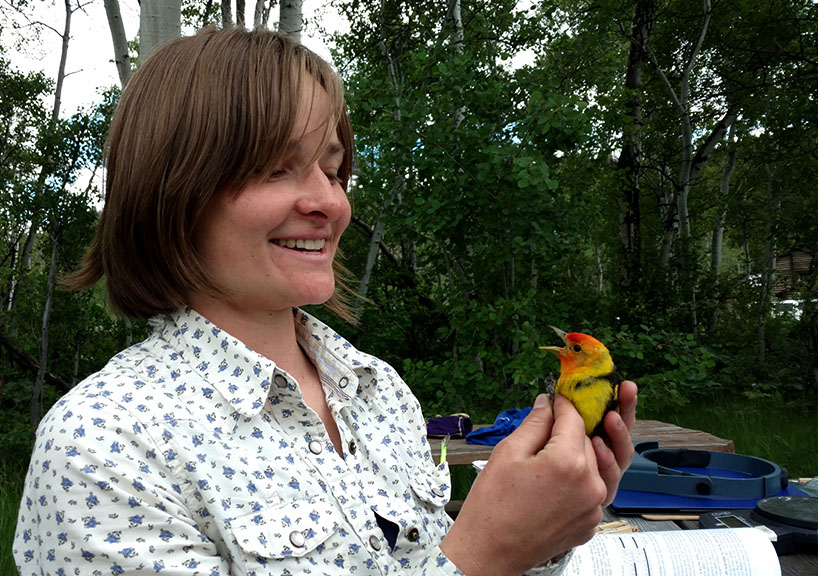Since 2003, Nature Mapping Jackson Hole volunteers have monitored 104 Mountain Bluebird (MOBL) nestboxes along the National Elk Refuge (NER). Over the course of many years the loss of standing aspens, cottonwoods, and other riparian vegetation due to thousands of browsing elk has meant the loss of nesting habitat for cavity-dwelling birds such as, the Mountain Bluebird. Historically, bluebirds depend on nest sites in decaying trees and on nesting cavities excavated by woodpeckers and other bird species. JHWF’s Mountain Bluebird Nestbox Monitoring Project is designed to mitigate for this habitat loss by providing artificial nest cavities to support breeding.
A new addition to the monitoring project this summer, our volunteers will have the opportunity to monitor a total of a 110 nestboxes, and see what happens to the birds after they leave the nestbox by banding nestlings and collecting data on their activity post-fledge. JHWF has secured a Chapter 33 permit from the Wyoming Game & Fish Department for scientific research and hired bird bander Allison Swan (in collaboration with the Teton Raptor Center) to execute the banding program.

WGFD Chapter 33 Permit. Maybe JHWF’s first!
Banding birds provides critical data for demographic studies and the management and conservation of those populations. We know with certainty that habitat loss has played a role in declining populations of Mountain Bluebirds, but we aim to learn if and how other factors have affected this species. Hence, it is important for us to collect data via banding to evaluate survival rates of young, dispersal patterns, renesting rates, productivity by age, and other measures of population dynamics. This type of information will allow us to see how the birds have been faring in Jackson Hole and to ascertain land management options with this species in mind.
NOTE: Banding is completed quickly and does not hurt the birds!
Stay tuned for more news from the field as the summer progresses and baby birds take to the skies!
About Allison Swan:
A Wyoming native, Allison Swan is a graduate of The Evergreen State College with a BA/BS dual degree in ecology and ornithology. She has abundant experience working at Monitoring Avian Productivity and Survivorship (MAPS) stations with students and volunteers, as well as conducting ecological research on focal species. As a student and research fellow, she conducted ecological research on Pacific Wrens throughout the non-breeding and breeding seasons. She has also worked on a number of research projects including, songbird ecology in the rainforests of the Olympic Peninsula, breeding seabirds in Puget Sound, raptor surveys and raven telemetry in sagebrush country. When she’s not banding birds, she enjoys hiking, biking and spending time in the outdoors with her dog, Boulder.

Allison Swan banding a Western Tanager in Jackson Hole – June 15, 2017.
Photo credit for the banding photo on the Blog Page: Ellis Bird Farm

